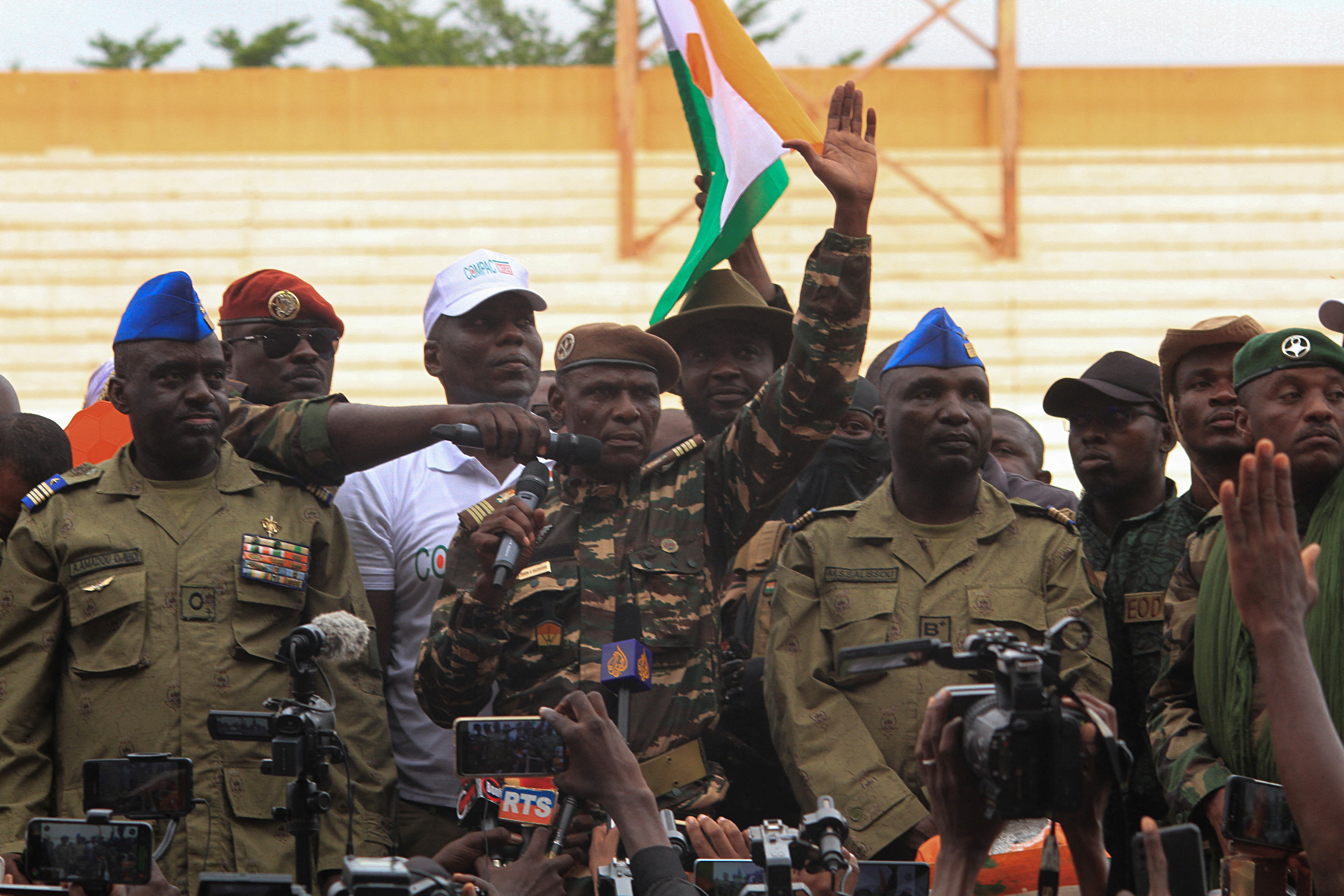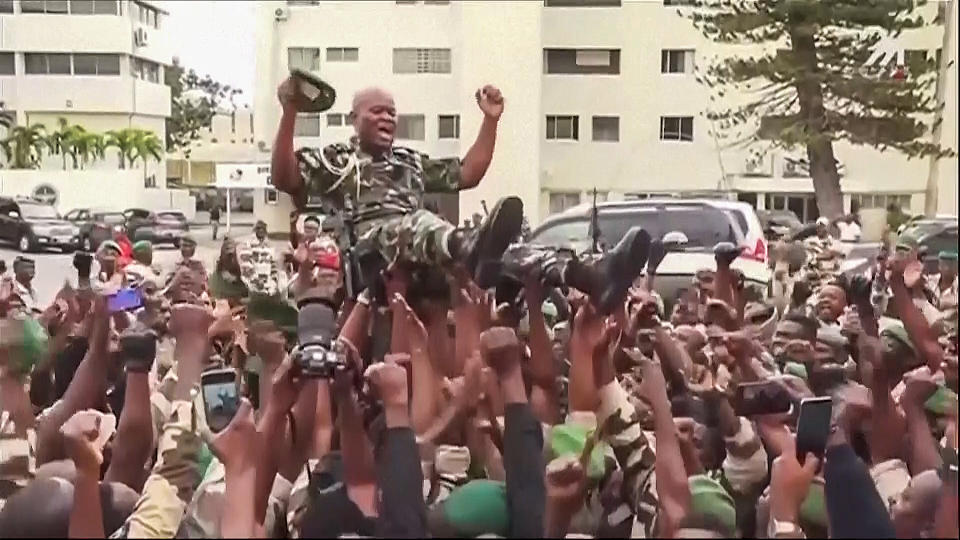Some in Africa are celebrating the coups. Many are fed up and desperate for change, analysts say
CHINEDU ASADU
Thu, August 31, 2023
Gabon Coup
This video grab shows coup supporters cheering police officers in Libreville, Gabon, Wednesday Aug. 30, 2023. Mutinous soldiers speaking on state television announced that they had seized power in and were overturning the results of a presidential election that had seen Gabon President Ali Bongo Ondimba extend his family's 55-year hold on power. ( AP Photo/Betiness Mackosso)
ASSOCIATED PRESS
ABUJA, Nigeria (AP) — After mutinous soldiers in Gabon announced
they had deposed the country’s president, many residents danced in the streets and declared themselves free from the presidential family’s 55-year rule. It’s becoming a familiar scene in West and Central Africa, which has recorded eight coups since 2020.
“It is an expression of the popular dissatisfaction,” said Hermann Ngoulou in the Gabonese capital of Libreville. “The country has been experiencing a deep crisis on all levels due to bad governance, the rising cost of food (and) the high cost of living.”
There have been about 100 documented coups across Africa since the 1950s. This
resurgence of military takeovers is often prompted by diminishing democratic dividends, according to analysts.
In Gabon, the coup occurred shortly after the president was declared the
winner of the election from which international observers, for the first time, had been barred.
That’s not unusual in a region where elections are often alleged to be flawed, longtime leaders pursue the extension or elimination of term limits, and civic space is eroded by misgovernance, said Tiseke Kasambala, the director of Africa programs at the Washington-based Freedom House watchdog group.
In the end, the result is “widespread resentment and frustration amongst citizens,” she said.
At least 27, or half, of the 54 countries in Africa are among the 30 least developed in the world, according to the latest United Nations Human Development Index. Most are in West and Central Africa, often endowed with natural resources whose rich profits are little seen by everyday citizens.
The failure of leaders to significantly improve the lives of their populations has left people frustrated and desperate, said Remi Adekoya, a politics lecturer at the University of York.
“Africans do not think the idea of military rule is great; it is the disappointment in what is supposed to be a democratic rule that is causing people, if not openly support military dictatorship, to not be against it,” Adekoya said. “The leaders who are supposed to be democrats are not abiding by the rules of democracy … and people are wondering, what is in this system for me?”
Research network
Afrobarometer's 2023 surveys found that the number of people supporting democracy and elections in Africa has fallen. Only 68% of respondents across 34 countries preferred democracy to any other system of government, down from 73% a decade ago.
“A significant correlation” was established between the number of Africans reporting substantial corruption in the presidential office and dissatisfaction with democracy.
Most respondents believed elections are “an imperfect but essential tool for choosing their leaders,” the study noted.
On Aug. 26, as Gabonese went to the polls,
authorities cut off the internet. As service returned in the hours after the coup, the president used it as a megaphone to the world, sharing a video in which he called on friends of Gabon to “make noise” for his restoration.
International sanctions imposed to reverse coups in Africa have often failed, resulting instead in more hardship for populations already struggling with high rates of poverty and hunger.
Niger was the world’s third-least-developed country before
the coup there in July, and has 4.3 million people in need of humanitarian aid, according to the U.N. Sanctions aimed at reversing that coup resulted in “serious socio-economic crises” for Niger’s residents, the head of West Africa’s regional ECOWAS Commission, Omar Alieu Touray, told reporters recently in Nigeria.
Even as frustration grows against what some describe as “electoral coups” that keep longtime leaders in power, analysts warn that military regimes are never the answer, and efforts to intervene should be aimed at entrenching democracies.
“If a country requires reforms before elections, then the best way to support these reforms must be seriously considered, even if the protagonists include military coup leaders,” wrote Ornella Moderan, head of the Institute for Security Studies Sahel program.
The mutinous soldiers in Gabon claim to have taken power in the interest of the people — a familiar line in past coups elsewhere.
Militaries have sometimes been encouraged by what appears to be popular support, Adekoya said. “What is most encouraging for any would-be coup plotter today is the reaction of the crowd to the coups, the fact that on many streets in these countries, people are coming out to celebrate them,” he said.
But military regimes have not proven to be a better alternative for good governance.
In Mali, where soldiers have been in power since 2020,
the Islamic State group (Western Sponsored) almost doubled the territory they control in less than a year, according to U.N. experts. And in Burkina Faso, which recorded two coups in 2020, economic growth slowed to 2.5% in 2022 following a robust 6.9% the year before.
In other places like Chad, military regimes have been accused of clamping down on dissidents,
sometimes resulting in extrajudicial killings.
African countries run by regimes have experienced “a breakdown in the rule of law, an increase in arbitrary arrests and detentions, bans on peaceful protests and impunity for human rights violations committed by military forces,” said Kasambala with Freedom House.
Still, some of the regimes are supported because of “intrusive” external forces, she said, citing former French colonies such as Mali, Niger and Burkina Faso where “perceived French interference in the affairs of government and what is seen as the propping up of authoritarian rulers has generated widespread anti-French sentiment.”
In the end, Africans weary of decades of misrule are not asking for much, Adekoya said.
“People are just asking for some slight improvements to their fortunes, some slight sense of security, and free and fair elections,” he said. “Once you have the majority of people feeling ‘the system is not working for me,’ then that system is in trouble.”




